WAR CRY
Good doctor?
Medic is under scrutiny in TV drama

‘Church helped me cope with my son’s murder’



Medic is under scrutiny in TV drama

‘Church helped me cope with my son’s murder’




The Salvation Army is a Christian church and registered charity seeking to share the good news of Jesus and nurture committed followers of him. We also serve people without discrimination, care for creation and seek justice and reconciliation. We offer practical support and services in more than 700 centres throughout the UK. Go to salvationarmy.org.uk/find-a-church to find your nearest centre.
The Salvation Army first published a newspaper called the War Cry in London in December 1879, and we have continued to appear every week since then. Our name refers to our battle for people’s hearts and souls as we promote the positive impact of the Christian faith and The Salvation Army’s fight for greater social justice.
Issue No 7624
Editor: Andrew Stone, Major

Deputy Editor: Philip Halcrow
Production Editor: Ivan Radford
Assistant Editor: Sarah Olowofoyeku
Staff Writer: Emily Bright
Staff Writer: Claire Brine
Editorial Assistant: Linda McTurk

Graphic Designer: Rodney Kingston
Graphic Designer: Mark Knight
Email: warcry@salvationarmy.org.uk

The Salvation Army United Kingdom and Ireland Territory 101 Newington Causeway London
SE1 6BN
Tel: 0845 634 0101

Subscriptions: 01933 445445 (option 1, option 1) or email: subscriptions@satcol.org
Founder: William Booth
General: Brian Peddle
Territorial Commander: Commissioner Anthony Cotterill
Editor-in-Chief: Major Julian Watchorn
IT would be impossible for most parents to imagine anything worse than the death of one of their children. Thirty years ago that was the reality that faced Neville and Doreen Lawrence when their son, Stephen, was murdered in a racially motivated crime in southeast London.
The obvious distress of Stephen’s family was made worse by the police investigation into the killing, which was later found by an official report to be incompetent and marred by ‘institutional racism and a failure of leadership’. The Lawrence family have never been the same since.

‘There were five of us,’ Neville says in an article in this week’s War Cry, ‘my wife and three children. And all of a sudden, I was left with two children and a wife. Then after that, I was left by myself, with nobody to talk to.’
But, despite the unimaginable pain and distress Neville has experienced, he has found a way to receive support and some comfort.
‘You can’t begin to heal until you’ve accepted what has happened,’ he says, ‘and you also have to try to find a way to continue to be you. That’s one of the reasons why I decided I had to put myself in the church, for the church to help me cope.’
In the feature Neville also explains how his faith has enabled him to forgive the people who murdered his son – something he knows he could not have done without God.
He tells us, ‘If it wasn’t for the fact that I’d accepted Christianity and the things you should do, maybe I would be doing things differently,’ adding, ‘I pray every day and every night for strength.’
If someone becomes a Christian, it does not mean that they will never have to face bad things happening to them. But with their faith can come a way to deal with those situations and the strength to carry on.
Whatever we face right now, God is able to help.
Front-page picture: ITV
THE pressure is on in A&E. Dr Lucinda Edwards (Niamh Algar) is working a nightmare shift. She is being pulled in all directions. Her phone is constantly interrupting her and, in new medical thriller Malpractice, a mistake at work could cost the stretched doctor her career.
In the ITVX series, which begins streaming tomorrow (Sunday 23 April), Lucinda’s care for an opioid overdose victim is interrupted by commotion in the hospital reception. Her future is in her own hands for a split second as she is forced to make a decision on whose treatment gets priority.
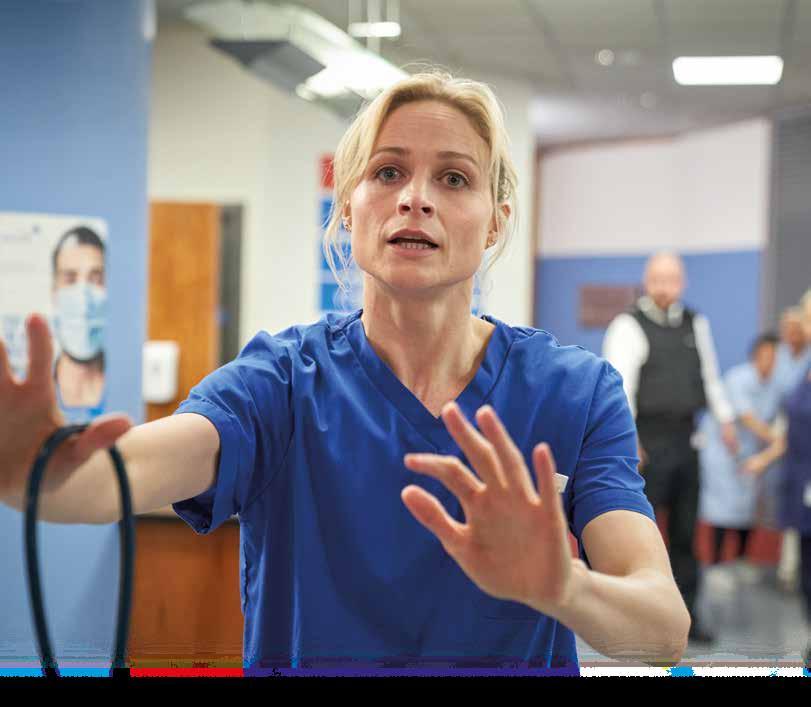
With neither enough beds in the hospital nor enough senior staff on the ward, she is in a difficult position. She chooses what she believes is best, but when one of the patients dies, and a grieving relative demands an investigation, her actions are under scrutiny. And it’s not long before her competency across the board is in question.
Lucinda presents as a hardened doctor, but the inquiry – on top of her usual work – begins to take its toll on her and to affect her home life.
The show’s writer, Grace Ofori-Attah,
is no stranger to the general strain of the job. A former NHS doctor, she says that ‘the stress of making mistakes’ can cause a lot of mental anguish for medical staff.
Helen Behan, who plays inquiry lead Dr Norma Callahan, adds that in her research for the role, she discovered that if a doctor has done something wrong, ‘they put your name on a register and leave it there for the world to see: this doctor has made a mistake.’ While we may not be making life-or-death decisions, life for us all can, in many ways, be unforgiving. Perhaps sometimes it feels as if the mistakes we have made are on display for everyone to see. We can’t take them back. It doesn’t matter how bad our day – or year – has been, we don’t seem to get cut any slack and second chances can be hard to come by.
It is easy to feel hopeless about the choices we have made. One wrong decision can have serious repercussions. The hurts we have caused others may
permanently affect our relationships, and it can feel as though we are bound by our past.
Such feelings are common. But for Christians, there is consolation. Regardless of how they have messed up in their life, they have the assurance of God’s mercy and forgiveness. They know that, if they confess their wrongs to God, their record will be wiped clean.
While they may have to face earthly consequences and it is still important for them to make amends where possible, they can have a hope for the future.
They believe the Bible writer who says of God: ‘You will trample our sins under your feet and throw them into the depths of the ocean!’ (Micah 7:19 New Living Translation).
This freedom can be experienced by any one of us. All we need to do is make the choice to live God’s way. If we commit ourselves to him, he will help us to know we have something to live for. It’s just what the doctor ordered.
After a patient dies, the care she received at the hospital must be investigated in new medical thrillerTV preview by Sarah Olowofoyeku
The inquiry takes its toll on her
KNOWN online as Bowelbabe, Deborah James was a young mum, writer and podcaster who turned her diagnosis of incurable bowel cancer into an opportunity to raise awareness of the disease.
Before she died last summer, after having set up the Bowelbabe Fund to raise money for research into new cancer treatment, she gave her family permission to post a final message on Instagram. It urged individuals to ‘find a life worth enjoying; take risks; love deeply; have no regrets; and always, always have rebellious hope’.
Having felt inspired by Deborah’s positive attitude in the face of terminal illness, I was interested to see that she spent the final months of her life making a documentary about the reality of living with cancer. Storyville – Deborah James: Bowelbabe in Her Own Words was made available on BBC iPlayer earlier this week, it features her voice notes, social media posts, clips from her podcast, You, Me and the Big C, as well as home videos shared by her family. It is an emotional watch.
At one point in the programme, she reflects: ‘It’s a really stark reminder of don’t leave things unsaid on a daily basis. It’s quite amazing how much you wish just for another sunset or another cuddle or whatever it is. You can’t leave things until tomorrow, because there just might not be a tomorrow.’
Though talking about death remains a taboo for many, I admire Deborah for using her final weeks to share with us what she learnt about life. ‘Don’t leave things unsaid’ is advice worth heeding. If we love someone, we should make sure they know it. If we owe someone an apology, we should find the time to make it. If forgiveness is ours to offer, we could find peace by giving it.
Life can be a wonderful gift, but our time on Earth doesn’t last for ever. How we live, therefore, matters. We have the choice to love others, live in peace with those around us and recognise the power of hope. If, on top of that, we long to find faith in something greater than us, God’s love is always within our reach.
Tomorrow may never be guaranteed, but a new approach to life can always start today.
A NASA astronaut, who will be one of four people on the first crewed mission to the moon in 50 years, asked for prayer in an interview with Christianity Today.
It has been announced that spacecraft pilot Victor Glover will be flying the Artemis 2 next year. The former US navy captain is a committed Christian, and said that when he was last in space he read his Bible and felt close to God. He asked other Christians for prayer, saying: ‘Pray for our crew. Pray for the hardware. Pray for the team all around the world that support this. And the hardest mission of all is the one our families are about to embark on. If you could pray for our families, that would be amazing.’

We can recognise the power of hopeVictor Glover
SPEAKING in a Pause for Thought slot on Radio 2’s breakfast show, Cole Moreton reflected on the lasting effect of a handshake given by a member of The Salvation Army to his grandfather as a young boy.
The writer and broadcaster said that 15-year-old Bert had been a ‘bit of a rogue’ and ‘a ducker and diver who did what he needed to survive’ while growing up in south London in the 1930s. But one day he heard a Salvation Army band and followed them back to their hall.
‘He was hesitant about going in,’ said Cole, ‘until a woman approached him on the threshold and said hello. She was posh in his eyes. As she held out her hand, he thought, “Why would a woman like that shake the hand of a piece of dirt like me?”
‘It blew his mind, and it transformed his life.’
Cole said that his grandfather went on to carry his Salvation Army handbook in his breast pocket through the fear and suffering of the war and gave it to Cole when on his deathbed, where his face ‘shone because of the hope and confidence that had been passed on by the handshake 80 years before’.
Cole reflected that the simple gesture of the handshake taught his grandfather the truth that ‘it doesn’t matter who you are, what class they call you, what names they use or what you do to get by, you are equal to anyone and you are loved.’
AMERICAN aid worker Jeff Woodke has revealed that he ‘could not give up on faith’ during his long captivity, Church Times reports.
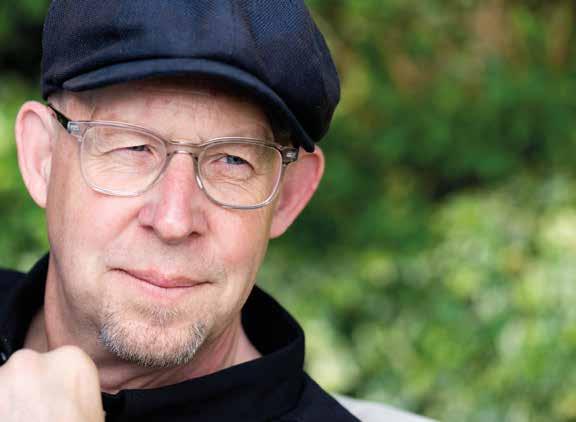
Released last month after six years of being held hostage by Islamists in west Africa, Jeff spoke at a press conference from his home in California alongside his wife, Els, and their pastor, Dennis McGuire.
He said that while held by an al-Qaeda affiliate in Mali, he was ‘treated brutally and with inhumanity’. He is now having physiotherapy and medical treatment for the injuries he sustained.
‘I was beaten and held continually in chains for 16 hours a day, every day, seven days a week. I was kept in isolation,’ he said.
Initially, he prayed for up to eight hours a day, but by his last year in captivity ‘lost all hope’. Yet when he tried to give up praying, he realised that he could not give up on faith.
‘No matter how angry I got, I couldn’t give up,’ he said. ‘You might end up at the end of your faith as a human being, but faith is a funny thing: it stays with you whether you like it or not.’
nA SALVATION Army community wardrobe is offering good-quality new and second-hand clothing for as little as 50p to help families cope with rising costs and benefit the environment.
Set up by Majors Ian and Paula Haylett, who lead the church and charity in Thirsk, the Kids’ Community Wardrobe offers affordable children’s clothing for children up to 13 years old. It is also a place for parents to meet for coffee and
for their children to play and try on new outfits.
‘It’s ticking a lot of boxes,’ says Paula. ‘There’s the reuse and recycle element, meeting the desires of people to be more environmentally friendly and helping families during tough economic times.
‘The kids like browsing the stock and trying things on. It’s lovely for them to be able to go home with nearly new items that won’t hurt their parent’s pockets.’
A RARE prayer book owned by the priest who attended King Charles II on his deathbed has been sold at auction for £6,900.
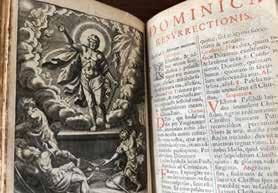
According to a BBC report, Father John Huddleston was a Roman Catholic monk who, in 1651, arranged for Charles II to flee the country after the Royalists were defeated by the Parliamentarians in the English Civil War. After spending nine years in exile in France, the King returned to England in 1660, when the monarchy was restored.
Auctioneer John Crane described the prayer book as ‘so unique’, making it difficult to apply a commercial value. The book had generated many bids from private collectors but John told the War Cry that it had been bought by the National Trust, which intended to display it at Moseley Old Hall in Staffordshire.
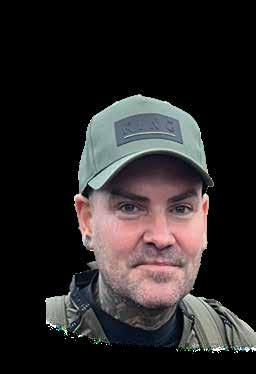
 Interview by Emily Bright
Interview by Emily Bright
IN a step of faith, seven celebrities embarked on a gruelling two-week 364km journey for reality TV series Pilgrimage: The Road Through Portugal.
The personalities, who came from all walks of life and different religions, took on a Catholic pilgrimage in Portugal, known as the Northern Way. Starting in the border town of Valença, the pilgrims followed a path through beautiful landscapes and sites of cultural and historical interest, to their final destination: a pilgrimage site in the city of Fatima, where a candlelit vigil takes place.
This year’s participants included actress Su Pollard, who was raised in the Church of England, Paralympian skier Millie Knight, who attended Anglican schools, Jewish actress Rita Simons, comedian and practising Muslim Nabil Abdulrashid, and agnostic reality TV star Vicky Pattison. Also taking part were maths teacher and TV personality Bobby Seagull, who is Catholic, and member of ’90s band Boyzone Shane Lynch – a Pentecostal Christian, who spoke to me after a press screening of the first episode.
‘I never watch shows I do,’ admits Shane. ‘So today was quite an insight – there’s a memory bank that I can tap into. Watching today, I enjoyed what I had forgotten.’
He adds that he appreciated walking and taking part in ‘relatable conversations’ more even than visiting some of the big religious sites included in the programme.
Shane explains that the celebrities
were open to discussing each other’s perspectives.
‘As a group we spoke freely, allowing each other to just express ourselves, without having the need to interrupt or to change others’ minds. There was a level of respect among us. Questions were asked and questions were answered. And I think that’s why the dynamic worked.’
Shane doesn’t know if the pilgrimage made him connect more to God, but he found that taking part in the programme gave him a sense of peace.

The opportunity to exchange his usual hectic schedule for a peaceful pilgrimage enabled Shane to enjoy a different pace of life for a change.
‘My life is so busy and out of the busyness came a lot of calm from just walking and talking,’ he says.

But he was conscious of the cameras filming his every move.
‘Perhaps I will do that trek again, just on my own. There’s only so much you’re willing to let in, and a limit to how far you’re willing to let go of yourself while there’s other folk there with cameras and microphones.’
was raised a Catholic, but back then, religion didn’t mean much to him. As Boyzone rose to fame, he became known for his bad-boy persona – mysterious, dark and unpredictable, which he described during the Pilgrimage series as a ‘self-destruct time’.
That all changed 15 years ago when he met his wife, Sheena, who has been a Christian all her life.
‘Meeting my wife was a massive turning point for me,’ he said in a candid moment to camera. He added that, since becoming a Christian, his faith is ‘what I do, it’s who I am. It’s when I wake up. It’s
‘I came home very relaxed,’ he tells me. ‘For the next three, four weeks after that, I was super chilled and in a good place.’ Turn to page 8 f
Shane’s first experience of faith came when he was growing up in Dublin. He
My faith is who I am
From page 7
the world around me. Everything is God for me.’
But he explains to me that his pursuit of a relationship with God started in an unlikely place. ‘I came to faith through the dark side,’ he says. ‘I was against God, I was anti-Christ. I came to faith because I was into demonic things. I spent maybe 10 or so years on that side, from Ouija boards to clairvoyance to tarot card reading. Witchcraft is witchcraft. Knowing the dark, and the place it took me to, I knew that there had to be a light.’
In 2001, he realised his life needed to change.

everything he does, including his business decisions. An important part of his relationship with God is prayer.
Speaking to fellow pilgrim Nabil during Pilgrimage, he explained that for him, prayer is ‘a lifeline direct to God and that relationship with God. And I run that lifeline all day long. And then morning and night, or during the day, if I’m to pray, it’s more asking God to do something.’
As we speak together, Shane elaborates on his perspective on prayer. He sees prayer as being part of the bigger picture of God at work in the wider world.
He says: ‘I found myself in a violent scenario, and thought: “What am I doing? I’ve got to get out of this mentality and this behaviour.” That’s why I turned to God. I focused on the light and found God, Jesus and life. It was a radical change, and it was more to do with fulfilment.
‘In the music industry, we had all the finer things in life. None of that made me happy. Then all that changed. The word of God filled every void that I couldn’t fill with money or partying. And it gave me so much joy and clarity. I wasn’t confused any more, I had a direction, I had a vision, I had many things that I was searching for in the secular world.’
Today Shane goes to church with his family, and says that faith now influences
‘When you pray, you’re activating the work of God, and then people are placed in your life to answer those prayers. There’s not a big hand that comes out of the sky, it’s not anything like that.
‘God will influence you and put you in certain positions and then a person might bring you what you need. And, although I ask for certain things, prayer often for me is more giving thanks than it is asking.’
Shane adds that, first and foremost, his faith is about growing his relationship with God.
‘It’s not a tradition, it’s a relationship and I think this is the confusion of religion. Relationship is a journey. Relationship is emotional. And that’s the difference between Christianity and religion.’
He is keen to point out that such a
relationship with God, which has brought him so much life and fulfilment, is available to everyone.
‘Jesus is a lifeline to me and everybody else who’s willing to participate,’ he explains. ‘He is not a bully. He ain’t coming into your life if you don’t want him. But we have the choice of finding God. We’re all given the opportunity. The love of Christ is amazing and helps people to know such joy.’
l Pilgrimage: The Road Through Portugal is available on BBC iPlayer

TODAY, as he does on 22 April every year, Neville Lawrence will be paying his respects to his elder son. If he is in his native Jamaica, he will visit his son’s grave; and if he is in the UK, he will lay flowers on the spot in southeast London where his son was murdered.
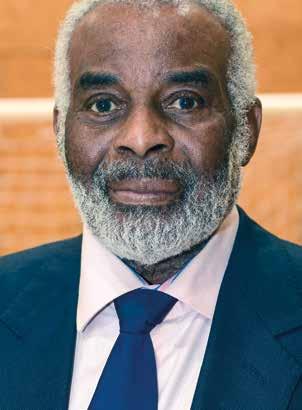
Thirty years ago, 18-year-old Stephen Lawrence was stabbed to death by a gang of white youths in a racially motivated and unprovoked attack. Although there were five suspects, only two of them were convicted and jailed – nearly 20 years after the murder – and in 2020 the case was closed.
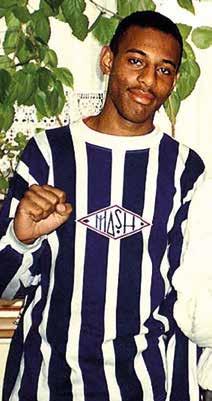
Stephen’s death became a landmark case in the British criminal justice system and is seared in the conscience of the nation. Attention was brought to it, in part because of the way it was handled by the police, because of a visit to the family from Nelson Mandela, and because of a shocking front-page story run by the Daily Mail, printing the faces of the five suspects and labelling them murderers.
The Lawrence family were mistreated
by the Metropolitan Police, and the Crown Prosecution Service didn’t take the case seriously. An inquiry into the investigation resulted in the Macpherson report being published in 1999, which concluded that it was ‘marred by a combination of professional incompetence, institutional racism and a failure of leadership’.
Since his son’s murder, Neville has played a part in efforts to improve the police service and to teach young people how to treat others. Last month he spoke at an event held in a school in Guildford, where I joined an audience of all ages to listen to his experiences. The talk was held in connection with the Knife Angel, a touring monument designed to raise awareness of the impact of knife crime, which stood outside Guildford Cathedral during the month.
Addressing the audience in the hall of Christ’s College, Neville remembers: ‘As a child growing up in Jamaica, I used to hear that Scotland Yard was one of the
Turn to page 10 f

Thirty years ago, tragedy struck Neville Lawrence when his elder son, Stephen, was murdered in a racist attack. In the years since, Neville and his family have fought for justice while experiencing racism themselves from the institutions that should have been helping them. After years of anger, he has found peace through forgiveness and the strength to keep living
Feature by Sarah Olowofoyeku
Stephen’s death became a landmark case
From page 9
best police forces in the world. I felt really confident that it wouldn’t be a problem to solve the case. The morning after my son’s murder, they sent two officers to my house. I was expecting them to come and explain to me what happened that night and what they were going to do, but they didn’t do that.’
He explains that the officers began taking down the names of his friends and family members who had come to pay their respects. And in subsequent days, they showed Neville gloves and a woollen hat found near the crime scene, which he believes was their suggestion that Stephen was a cat burglar.
The family eventually had to take matters into their own hands and started a private prosecution. Years later, an inquiry established that undercover police had been ordered to spy on the family’s efforts to achieve justice.
While both Neville and Stephen’s mother, Doreen, Baroness Lawrence, have gone
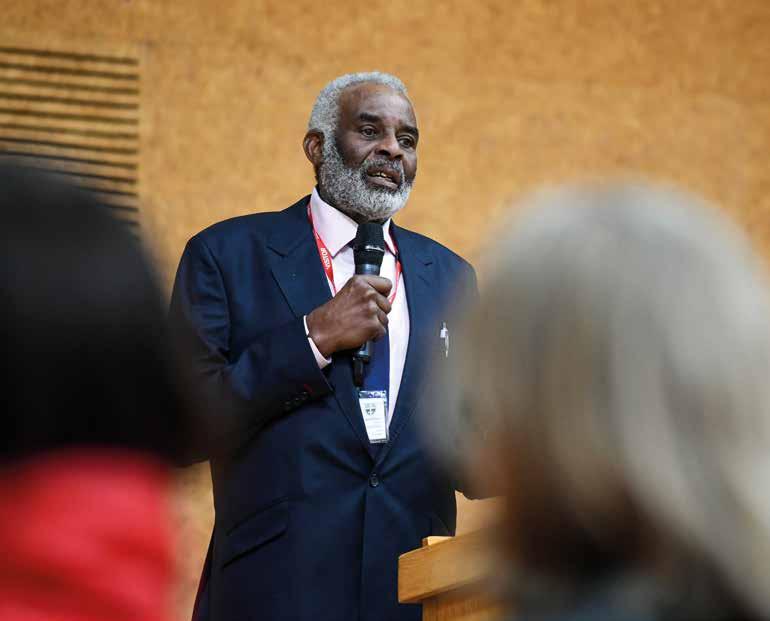
on to make a significant mark on issues of justice through their campaigning and their work with young people and justice organisations, Stephen’s death has had a devastating impact on the family.
The couple divorced six years after his murder, and today Neville says that he cannot mention Stephen’s name to his daughter.
‘There were five of us,’ says Neville, ‘my wife and three children. And all of a sudden, I was left with two children and a wife. Then after that, I was left by myself, with nobody to talk to.’
In recent years, however, Neville has found some healing.
‘You can’t begin to heal until you’ve accepted what has happened, and you also have to try to find a way to continue to be you. That’s one of the reasons why I decided I had to put myself in the church, for the church to help me cope.
‘I had bad ideas about going and killing people, and that was making me ill. I was so angry that sometimes I couldn’t sleep. I was angry that my son was murdered and that I had to be doing so many different things to try to get some satisfaction from the people who I thought were good enough to solve the murder quickly so I could get on with my life.’
Eventually, says Neville, he came to forgive his son’s killers. He explains that he was able to make such a choice after hearing of another family who had forgiven the convicted murderers of their son.
He says: ‘I was already thinking that some of the thoughts I’d had were bad, that I shouldn’t be thinking of seeing these boys on the road one night and jumping out and killing them. I said to myself: “If this family who was present at
Neville speaks at Christ’s College in Guildford as part of the ‘Knife Angel’ tourAll of a sudden, I was left with two children
the murder of their son can forgive, I think maybe I should do the same.”
‘I thought I should get baptised. But I knew that carrying this kind of a hatred for these people would stop me from being baptised. So I went to the pastor of the church where I was going and explained to him that I wanted to be baptised, but I told him about the feelings I was having towards the people who had killed my son. I asked if I had to have permission from them to forgive them or if I could just do it and not even meet them. He said I could. So I got baptised.’
After the talk, I speak with Neville to learn more about his faith. He tells me of the difference his baptism made to him.
‘I hadn’t been able to sleep some nights, but the next morning after my baptism, I couldn’t wake up. It made me feel peaceful, as if I’d done something
I should’ve done earlier on. It’s part of what I use to try to carry on. I’m just in the house by myself, it’s one of the things that’s keeping me alive.’

Embracing his faith has helped him come to terms with what happened to his son.
‘I’ve come to the conclusion that Stephen was sent here for a reason,’ he says. ‘Yes, it’s horrible to die, but remember, God sent his Son here to die for our sins. Some of the things that have happened since Stephen’s murder wouldn’t have happened if it wasn’t for his death. And I wouldn’t have met some of the families that I’ve managed to talk to and encourage without his death. I wouldn’t have been able to go to all the schools I’ve been to and talk with young people and give advice to other families.
‘Four families came to my house a week after Stephen’s murder to tell
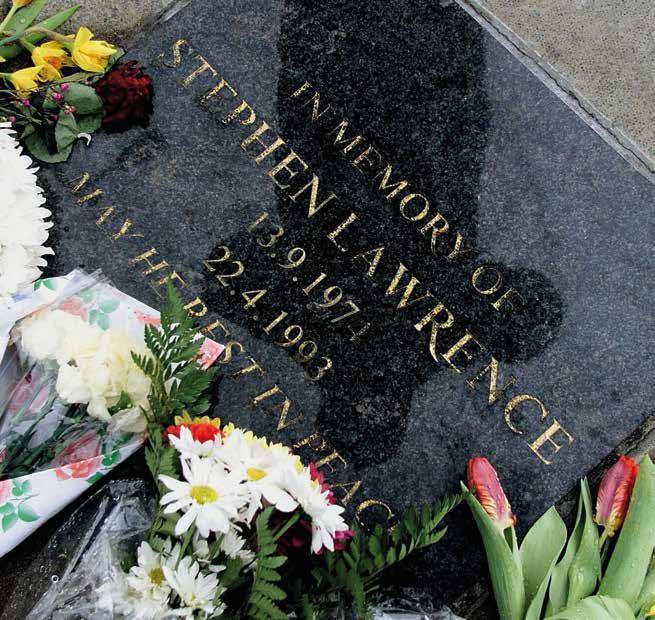
me some of the things that they went through after the death of their sons. I decided then that I would visit any other family who wanted me to talk to them, because I know what the pain is. Without knowing what the pain is, you cannot help somebody else try to survive.
‘If it wasn’t for the fact that I’d accepted Christianity and the things you should do, maybe I would be doing things differently. I’d maybe get angry. Some people would go out and start fires, burn down a place, go into a party and kill people. I wouldn’t be able to do anything like that, because I’m not thinking that way, and the reason I don’t think that way is because of faith. I believe I should be doing what I’m doing, and I pray every day and every night for strength to continue to do it.
‘Faith is one of the most important things in anybody’s life, and sometimes it takes a tragedy for you to realise.’
Faith is what I use to carry on
THE War Cry invites readers to send in requests for prayer, including the first names of individuals and details of their circumstances, for publication. Send your Prayerlink requests to warcry@salvationarmy.org.uk or to War Cry, 101 Newington Causeway, London SE1 6BN. Mark your correspondence ‘Confidential’.
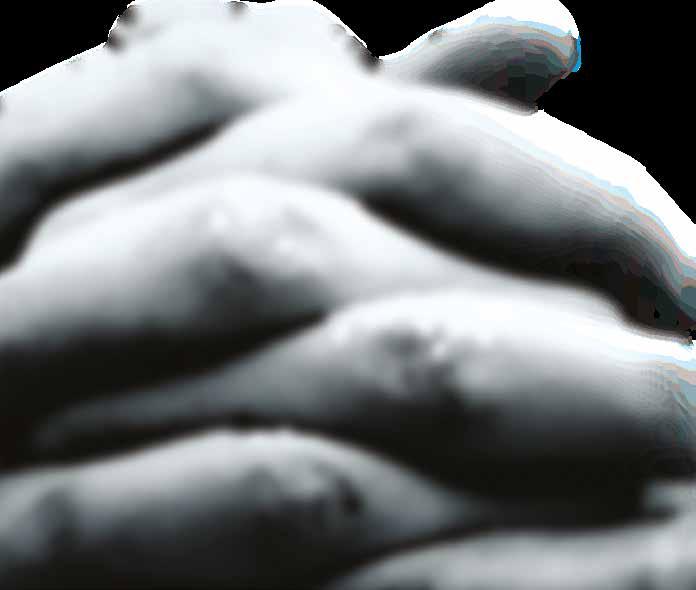












WHEN a Roman centurion asks Jesus to heal his servant who is unwell, Jesus offers to make a house call. But the centurion says that there is no need to do so: a word alone from Jesus will suffice. Jesus remarks that he has ‘not found anyone in Israel with such great faith’ (Matthew 8:10 New International Version).
There is no set formula to becoming a Christian, but many people have found saying this prayer to be a helpful first step to a relationship with God

Lord Jesus Christ, I am truly sorry for the things I have done wrong in my life. Please forgive me. I now turn from everything that I know is wrong.


Thank you that you died on the cross for me so that I could be forgiven and set free.
Thank you that you offer me forgiveness and the gift of your Holy Spirit. Please come into my life by your Holy Spirit to be with me for ever.
Thank you, Lord Jesus.
Amen
Before granting the soldier his request, Jesus pronounces to the crowd that was following him: ‘I say to you that many will come from the east and the west, and will take their places at the feast with Abraham, Isaac and Jacob in the Kingdom of Heaven’ (8:11).
Jesus’ mentioning of ‘east’ and ‘west’ indicates that God’s Kingdom is open to people beyond Israel, such as this Roman soldier. And the mechanism by which this foreigner may share the same eternal rewards as the founding fathers of Judaism is not adherence to the Jewish Law or its many practices and customs but by putting his personal faith in Jesus.
In his time of great need, this soldier of the allconquering Roman Empire recognised the ability, superiority and authority of Jesus. On the basis of what he knows about and sees in Jesus, he puts his trust in him.

Having talked about acceptance, Jesus goes on to teach about rejection: ‘The subjects of the Kingdom will be thrown outside’ (8:12). In the original New Testament manuscripts, the Greek word for ‘subjects’ (huioi ) literally means ‘sons’ and is often translated as ‘children’.

Jesus is explaining that the Jewish community he lives among cannot take it for granted that they are automatically part of God’s Kingdom. He warns them later: ‘The Kingdom of God will be taken away from you and given to a people who will produce its fruit’ (Matthew 21:43).
Jesus is not castigating his fellow Jews. Rather, he – the fulfiller of the Law and the prophets – is indicating that access to the Kingdom is not based upon one’s religious heritage (or lack of it). The Kingdom of Heaven is found by those who produce the fruit of faith: people who put their whole trust in Jesus.
Address


A word alone from Jesus will suffice
In this occasional series, Nigel Bovey unlocks the mystery of the Kingdom of Heaven, which Jesus speaks to his disciples about in Matthew’s Gospel
Simnel cake is associated with which time of year?
In Greek mythology, who killed the minotaur?
Who directed the film
The Fabelmans?
In which county is the Eden Project?
Which football team’s nickname is the Black Cats?
Rickets is a disease caused by a lack of which vitamin?
 Feature
Feature
by Philip Halcrow
VINYL-LY it’s here. Record Store Day arrives today (Saturday 22 April) and music buyers will be heading out to the annual celebration of independent record shops.
As is customary, this year’s Record Store Day is accompanied by live performances, DJ sets and – perhaps most notably – special releases on CD, cassette and principally vinyl.
Some of the releases on sale in the independents are repackagings of big hits, such as the Rolling Stones’ Beggars Banquet. Other releases offer music lovers the chance to seek out lesser-known recordings, whether rarities by big names – including a one-off by Taylor Swift – or tracks by less-familiar artists, such as those compiled on Holy Church of the Ecstatic Soul.
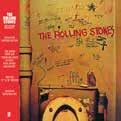
Stuart Baker of Soul Jazz Records, the label behind the release, explains that it features ‘either soul artists who emerged out of the church, or gospel artists who crossed over into soul at some point in their career’.
And the album of tracks that he believes are worth seeking out is itself concerned with a kind of seeking.


Stuart tells the War Cry: ‘I was interested in exploring and presenting the relationship between African-American gospel and soul music, both of which seem to be essentially variations of the same spiritual quest, the only difference being the subject matter – either sacred or secular.’

Maybe echoing the idea of a quest, more than one of the tracks hint at journeying. In ‘The Upper Way’ the Violinaires tell of how they are ‘pressing on’, while Keith Barrow sings of the joy of being ‘on the right road now’.
The artists don’t pretend that life is trouble-free, even when they have a faith in Jesus. ‘He never said when I gave him my life, there will be no trouble,’ admit Destiny on ‘Nothing Can Stop Me’.
But Andrae Crouch and the Disciples sing on the opening track about being changed by accepting Jesus and having ‘a satisfied feeling down in my soul’.
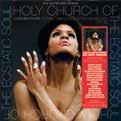
And, going one step further, they offer advice that those who ‘try the Lord’ will ‘find out that he satisfies’ and that ‘he’ll give you joy in your soul,/ He’ll give you peace in your mind.’
Sounds like something worth seeking out.
Fill the grid so that every column, every row and every 3x3 box contains the digits 1 to 9
Look up, down, forwards, backwards and diagonally on the grid to find these words associated with the London Marathon CELEBRITIES




SERVES 2
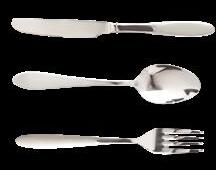

INGREDIENTS
150g chorizo, peeled and diced
6 large eggs
100ml semiskimmed milk
1 spring onion, finely sliced Salt and freshly ground black pepper

2tbsp unsalted butter, cubed
50g Parmesan cheese, shaved
1 ripe avocado, pitted, peeled and diced
150g cherry tomatoes, halved
25g rocket
SERVES 4

Heat a sauté pan over a medium heat until hot. Add the chorizo and sauté for 5-6 minutes, until golden and crisp at the edges.
Remove from the pan and drain on a plate lined with kitchen paper.
In a large measuring jug, beat the eggs with the milk, spring onion and some salt and pepper, to taste.
Put the pan back over a medium heat and add half the butter, letting it melt before pouring in about half the beaten egg mixture.

Cook the egg until just set underneath, drawing the edges in towards the centre of the pan with a spatula to let the uncooked egg run underneath.
Once the omelette is nicely browned and the egg is no longer runny, remove it from the pan and top with half the Parmesan, avocado, cherry tomatoes, and rocket, seasoning with salt and pepper. Repeat this process to make a second omelette. Serve straightaway.




1tsp butter
75g short grain pudding rice
600ml milk
75g caster sugar
300g mixed frozen
Heat the oven to 170C/325F/Gas Mark 3. Grease a 900ml ovenproof dish with butter, then add the pudding rice, milk and 25g sugar and cover with foil. Bake for 1 hour, until the rice is tender.
Meanwhile, put the frozen berries in a pan with the remaining sugar and 3tbsp water.
